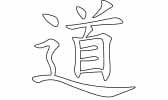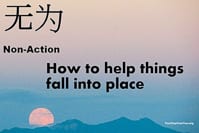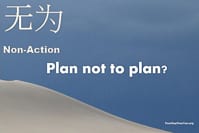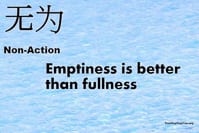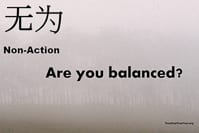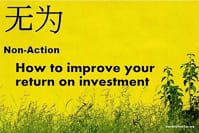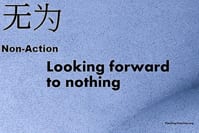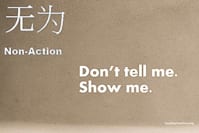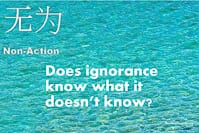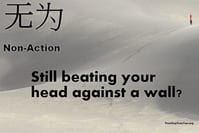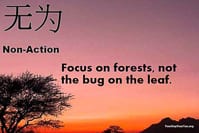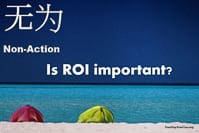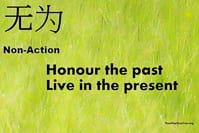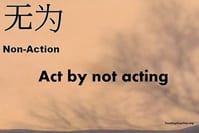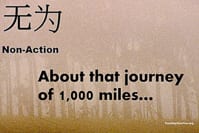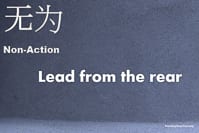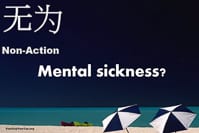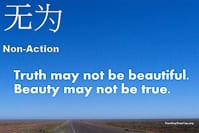Non – Action

Non-Action - an introduction
Wu-Wei is one of the most commonly misunderstood aspects of Tao. Its glyphs are usually translated as inaction or non-action. Better interpretations would be non-intrusive action or non-wasted action. The point is to stay in sync with your environment so you don’t interfere with natural processes. Then, when conditions are right, you work with them and they work with you and for you, instead of against you. Life’s a whole lot easier when our actions are in harmony with our surroundings and you don’t have to contrive things.
Read More
If you’re looking for a good restaurant dinner, you don’t arrive in the morning when only the clean-up crew is around. You wait until the kitchen and dining room are fully staffed and ready to serve you. Skilled jujitsu practitioners let their attackers commit to a course then, with minimal action and maximum skill, win the match by using their opponent’s strength against them. It’s all in the timing, in knowing when, where and how much action is appropriate for any situation. Years ago a flight instructor instilled in me the principle that a wise pilot uses their superior knowledge and skills to avoid needing to use their superior knowledge and skills. Read the winds of your life and you’ll be a better pilot, sailor or person.
Many of us have been to recitals and performances by beginners, who are mechanically correct in everything they do, but leave us cringing because they lack the flow of easy understanding, of being one with their subject. Their music, their dance, their sport, their whatever, is what they do, not who they are. Think of learning to ride a bike, play a piano, or juggle objects. In the beginning, we’re using our mind to learn. At a certain point we leave our mind behind and learn by feel, because the mind interferes with our flow of doing. We ride and perform our task instinctively, never using the conscious part of our brain. When we reach this point, we’re “going with the flow” or “in the zone” as we’ve heard many athletes and musicians describe how their best performances are characterized by a relaxed focus or single-mindedness on the task at hand. They’re not performing, they’ve become the performance. An environment’s non-essentials simply fall from their consciousness into the wallpaper. Is a joyous child splashing in a puddle thinking or simply being at one with their world?
Non-action doesn’t mean becoming a hermit and dropping out of society. Nor does it mean surrendering to structured rituals which may not be appropriate for a particular occasion.
Instead, it suggests that we recognize our situation and work with it. Most times we’ll find that it’s usually easier to use our energy to take steps that allow others to do their work.
Why force something that’s not ready when, with much less effort, we can create conditions that allow nature to take its course. Plant a seed now. Later on its fruits will nourish you. [Or, from the plant’s perspective, it lets you plant and nurture it so that it can reproduce.]
Recognize that there’s a harmony in the universe. The stars shine, the planets move and the rest of creation can do very well without human intervention. Remember that we’re simply part of the universe, not its controller. When you enter this lifetime, please check your ego at the door.
There is a tide in the affairs of men, which taken at the flood, leads to fortune.
Omitted, all the voyage of their life is bound in shallows and miseries…
We must take the current when it serves, or lose our ventures.
Brutus
Julius Caesar
Act IV, Sc 3
Enjoy.
Learn.
Live what you learn.
Want to learn more about what Tao says about non-action? Simply click on one of these boxes, below. You’ll find contemporary reflections on Tao’s verses dealing with it. Feel free to read them with – or without – your favourite version of the Tao-Te-Ching. Remember, these are thought-starters, not solutions. Solutions to your issues can only come from you.
